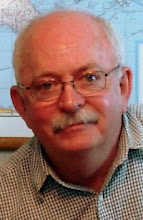
From The Advocate
Writer Thomas Disch's life had been hard over the last few years. His partner of 35 years, the poet Charles Naylor, died in 2005 after a long struggle with cancer that used up their savings. His own health was not good: Disch, a big man, was diabetic and had difficulty walking.
In October, the landlord of his rent-controlled apartment in Manhattan's Union Square won a decision in appellate court against Disch -- it was Naylor's name on the lease -- and was threatening to evict him. The pipes in his second home, in upstate New York, burst in 2007. When Disch assessed the damage months later, he found mold growing on keepsakes, books, the piano and the box containing his partner's ashes.
On July 2, he posted a piece on his blog, Endzone, about the rising price of food. Two days later, at 68, he shot himself in his apartment.
When we think about same-sex marriage, especially in states where it is legal, we tend to focus on happy couples like Phyllis Martin and Del Lyon, who married after more than 50 years together. We look at pictures of the newly betrothed surrounded by friends, family, and even cheering strangers. We treasure those symbolic moments of promise and commitment -- even as the hundreds of federal protections and benefits of heterosexual marriage remain vague abstractions.
But if Disch and Naylor had been married, at least one of those abstractions might have kept the science fiction writer in the world a little longer. Thanks to the 1989 decision in Raviv v. Raviv, their Union Square apartment would have been considered part of their communal marital property in New York -- even though the lease was in only one spouse's name.
Thomas Disch would at least have had the assurance that his home couldn't be taken away from him; his landlord would have had no legal standing to start proceedings against the grieving widower. But without marriage equality, same-sex couples have no protection against predatory landlords, hostile families or unsympathetic courts.
It's impossible to know someone else's heart; maybe Disch still would have killed himself. He had certainly been thinking about death. In a poem published on his blog in early June, he wrote:
Am I happy to have livedWe'll never know whether the specter of losing his apartment was the inspiration for his suicide or yet more fodder for the bleak outlook the writer couldn't shake. But one thing is certain: Gay marriage is more than a symbolic commitment -- it's a necessity.
When and where I did
America the 20th century
I've often said so
Grateful anyhow for my good luck
But I'll be happier soon
To have shed both when and where
My landlord has had me evicted
Katrina struck
As Charlie lay on the mattress
Of a New York hospice
And he had as little care
For the deaths of those other paupers
As for his own
May I achieve the same
Dark wisdom



|